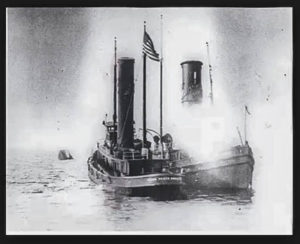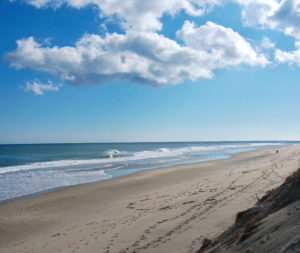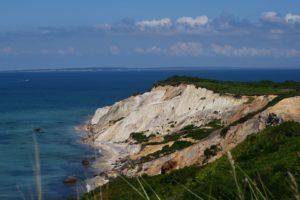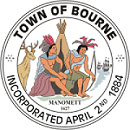A century ago America was embroiled in the First World War. Our country had joined the battle in Europe on April 6, 1917 though it had been raging for almost three years by then. The ‘war to end all wars’ seemed to be taking place so far away, however it ended up hitting close to home on Cape Cod. In fact it hit Cape Cod directly. For the first time since the Civil War, and the only time besides Pearl Harbor since, an enemy would attack American soil. The date was Sunday July 21, 1918 and the place was Nauset Beach in Orleans.
The tugboat Perth Amboy was at the center of this unprovoked attack. Built in 1912 the 139-foot ship was owned by the Lehigh Coal & Navigation Co. based out of present-day Jim Thorpe, Pennsylvania. It was captained that day by J.H. Tupley.
On that date, as the war was in its final stages, a tugboat and four barges were traveling just off the coast of Orleans when an enemy struck from beneath the water. At 10:30am a German U-Boat fired upon the fleet and continued firing for an hour and a half. The shells set the Perth Amboy on fire and heavily damaged the four barges, sinking three of them. Ironically, the only barge to survive was wooden, while the other three, made of steel, were sunk. Some of the shells fired by the German submarine landed on Nauset Beach making it the only spot of American soil struck by the enemy during the war. Three seaplanes were scrambled from nearby Chatham Naval Base spotting the submarine four miles off shore. However, not being equipped for battle the best they could do was drop tools like wrenches down onto the vessel before in scurried away underwater.
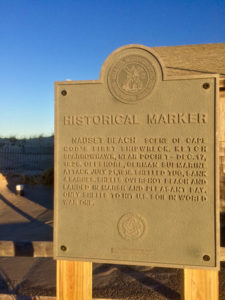 Twelve men, four women, and two young boys from the four barges and all sixteen of the crew of the Perth Amboy, twelve men and four women, survived and were safely brought ashore in Orleans though a few of them with more serious injuries were brought up to Boston for treatment.
Twelve men, four women, and two young boys from the four barges and all sixteen of the crew of the Perth Amboy, twelve men and four women, survived and were safely brought ashore in Orleans though a few of them with more serious injuries were brought up to Boston for treatment.
The aftermath of the attack was shock and excitement. There would not be a second attack though. People gathered on the beach and collected shrapnel from the shells which struck the sands at Nauset. Those reminders of the war would go to good use on the following Thursday July 25th at an auction for the Red Cross in Vineyard Haven. The shrapnel from the German shells along with battered bread pans and a coffee pot from the Perth Amboy were sold. The coffee pot was sold to a local summer resident of the Vineyard who then made some coffee on the spot so he could toast to the Allied Forces of World War I.
Early in 1919, six surfmen and the captain of the Orleans Coast Guard station were awarded the coveted Overseas Chevron. The seven were awarded the gold stripes usually reserved for soldiers who had fought at war overseas for six months. This was due to their actions in aiding the crew of the Perth Amboy and even being so close to the concussion of the shells that it knocked one of their hats off their heads. Even as late as the spring of 1919 the wrecks of the three sunken barges remained partially above water, with masts being visible above sea level.
The U-Boat would continue to wreak havoc along the coast of Maine and Canada in the weeks that followed, sinking Allied and neutral vessels. In a fitting end though the submarine and its crew would meet its fate as it headed back to Germany. The vessel struck a mine off of the coast of Norway and sunk to the bottom taking its entire crew with it.
The Perth Amboy would remain afloat despite being shelled and would even make a similar trek along the coast of the Cape a few years later. In 1922 it would tow an old government ship, Granite State, to Eastport, Maine where it was to be used for scrap. Perth Amboy’s crew stopped for the night in Provincetown on the way. The tug would be sold in 1936 to the Moran Towing Company out of New York City where its name would be changed to Nancy Moran. In 1941 it was sold yet again to the United States Maritime Commission. The former Perth Amboy would meet its end in 1946 when it collided with a tanker in the English Channel.
A century ago Cape Cod saw its shores rocked by shells from an enemy submarine during World War I. The event is commemorated with a marker at Nauset Beach in the parking lot.
By Christopher Setterlund





